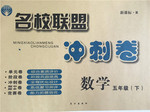题目内容
—Did you tidy your room??
—No,I was going to tidy my room but I visitors.?
A.had B.have? C.have had D.will have
A
由“Did”和“was going to”可知是过去发生的事情。

 名校联盟冲刺卷系列答案
名校联盟冲刺卷系列答案 名校提分一卷通系列答案
名校提分一卷通系列答案 课程达标测试卷闯关100分系列答案
课程达标测试卷闯关100分系列答案 新卷王期末冲刺100分系列答案
新卷王期末冲刺100分系列答案Did you know that women’s brains are smaller than men’s? The average women’s brain weighs 10% less than men’s. Since research has shown that the bigger the brain, the cleverer the animal, men must be more intelligent than women. Right? Wrong. Men and women always score similarly on intelligence tests, despite the difference in brain size. Why? After years of study, researchers have concluded that it’s what’s inside that matters, not just the size of the brain. The brain consists of “grey matter” and “white matter”. While men have more of the latter, the amount of “thinking” brain is almost exactly the same in both sexes.
It has been suggested that smaller brain appears to work faster, perhaps because the two sides of the brain are better connected in women. This means that little girls tend to learn to speak earlier, and that women can understand sorts of information from different sources(来源)at the same time. When it comes to talking to the boss on the phone, cooking dinner and keeping an eye on the baby all at the same time, it’s women who come out on top every time.
There are other important differences between two sexes. As white matter is the key to spatial (空间的) tasks, men know better where things are in relation to other things. “A great footballer always knows where he is in relation to the other players, and he knows where to go,” says one researcher. That may explain one of life’s great mysteries: Why men refuse to ask for directions … and women often need to!
The differences begin when fetuses (胎儿) are about nine weeks old, which can be seen in the action of children as young as one. A boy would try to climb a barrier before him or push it down while a girl would attract help from others. These brain differences also explain the fact that more men take up jobs that require good spatial skills, while more women speech skills. It may all go back to our ancestors, among whom women needed speech skills to take care of their babies and men needed spatial skills to hunt, according to one research.
If all this disappoints you, it shouldn’t. “The brain changes throughout our lives according to what we do with it,” says a biologist.
1.Which of the following is TRUE according to the first paragraph?
|
A.Women’s brain is 10% less than men’s. |
|
B.Grey matter controls thinking in the brain. |
|
C.Grey matter plays the same role as white matter. |
|
D.Both sexes have the same amount of white matter. |
2.What can we infer from the second and third paragraphs?
|
A.Women don’t need to tell directions. |
|
B.Women prefer doing many things at a time. |
|
C.Men have weaker spatial abilities. |
|
D.Men do better dealing with one job at a time. |
3.Which of the following do you agree with according to the fourth paragraph?
|
A.Young boys may be stronger than young girls. |
|
B.Women may have stronger feelings than men. |
|
C.More women take up jobs requiring speech skills. |
|
D.Our ancestors needed more spatial skills. |
4.What is the writer’s attitude in writing this passage?
|
A.Defensive. |
B.Persuasive. |
C.Supportive. |
D.Objective. |
第二节信息匹配 (共5小题;每小题2分,满分10分)
阅读下列应用文及相关信息,并按照要求匹配信息。请把答案填写在答题卡上将对应题号上。(选E项,在答题卡上将A,B涂黑; 选F项,在答题卡上将C,D涂黑)
首先,请阅读下列应用文:
The weekly magazine tells what you need to know if you’re thinking of traveling. Helpful advice on what to pack and what to buy once you’re there. Lots of colour photos to help you choose the best hotel, the cheapest flights and a special guide to different climates each week. |
|
E. Wired This magazine is designed for leaders in the field of information engineering including top managers and professionals in the computer, business, design and education industries. Published by Conde Nast Publications Inc, Wired often carries articles on how technology changes people’s lives. |
|
F. EUROPE NEWS The weekly magazine keeps you in touch with what’s happening. Filled with facts and figures about almost everything you can think of, plus articles by our regular writers on the week’s most interesting new stories. Special back page sums up the news for the busy readers. |
请阅读以下读者的信息,然后匹配读者和他/她最适合的杂志:
61. Bill travels a lot when he was younger. Now that he has stopped his work, he enjoys reading about foreign people, places and customs even if he has already visited that part of the world.
62. Emi is a university student studying Italian and Politics. She doesn’t have much time to read anything very detailed but she is looking for something with plenty of news and information.
63. Ben serves as an assistant to the general manager of an American company in Los Angeles. He is very interested in management and the use of high technology.
64. Up till now Brigitte has never traveled far so this year she has decided to go abroad for the first time. The travel agent suggests that she should read about various countries first before choosing her holiday.
65. Susan likes shopping. She is interested in buying clothes and she needs to be offered advice on clothes.
